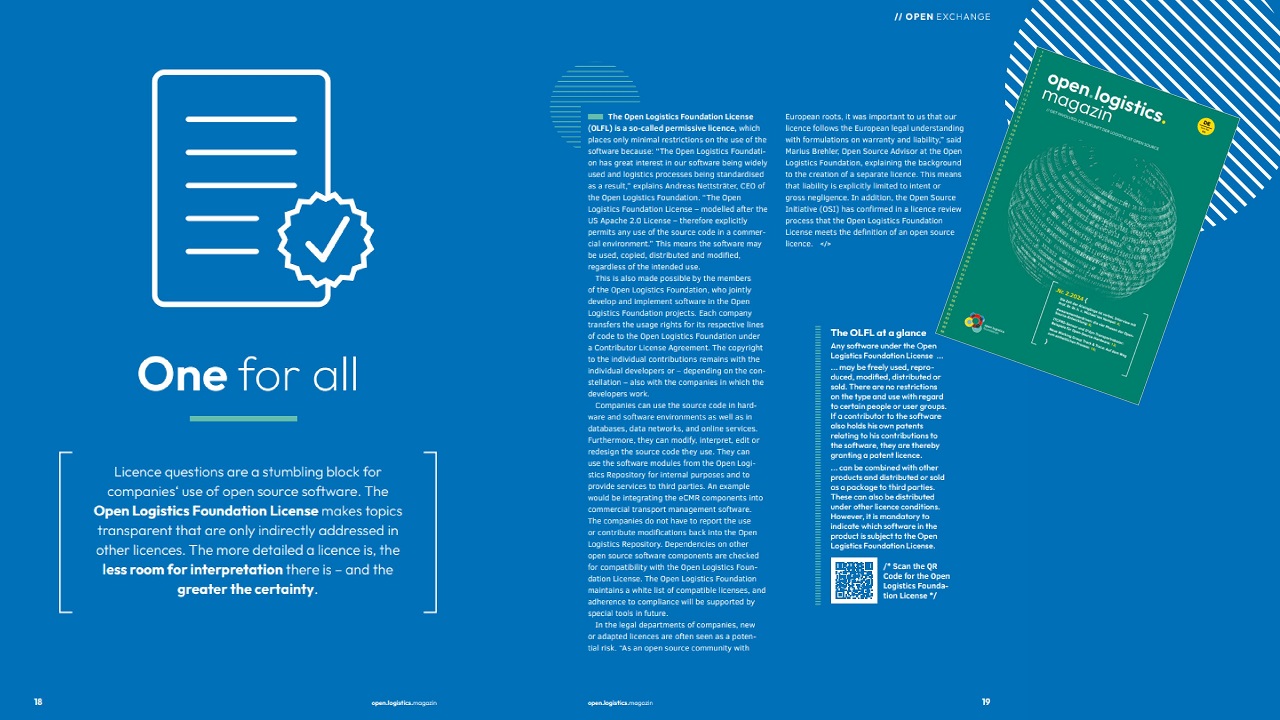The Open Logistics Foundation License (OLFL) is a so-called permissive licence, which places only minimal restrictions on the use of the software because: “The Open Logistics Foundation has great interest in our software being widely used and logistics processes being standardised as a result,” explains Andreas Nettsträter, CEO of the Open Logistics Foundation. “The Open Logistics Foundation License – modelled after the US Apache 2.0 License – therefore explicitly permits any use of the source code in a commercial environment.” This means the software may be used, copied, distributed and modified, regardless of the intended use.
This is also made possible by the members of the Open Logistics Foundation, who jointly develop and implement software in the Open Logistics Foundation projects. Each company transfers the usage rights for its respective lines of code to the Open Logistics Foundation under a Contributor License Agreement. The copyright to the individual contributions remains with the individual developers or – depending on the constellation – also with the companies in which the developers work.
Companies can use the source code in hardware and software environments as well as in databases, data networks, and online services. Furthermore, they can modify, interpret, edit or redesign the source code they use. They can use the software modules from the Open Logistics Repository for internal purposes and to provide services to third parties. An example would be integrating the eCMR components into commercial transport management software. The companies do not have to report the use or contribute modifications back into the Open Logistics Repository. Dependencies on other open source software components are checked for compatibility with the Open Logistics Foundation License. The Open Logistics Foundation maintains a white list of compatible licenses, and adherence to compliance will be supported by special tools in future.
In the legal departments of companies, new or adapted licences are often seen as a potential risk. “As an open source community with European roots, it was important to us that our licence follows the European legal understanding with formulations on warranty and liability,” said Marius Brehler, Open Source Advisor at the Open Logistics Foundation, explaining the background to the creation of a separate licence. This means that liability is explicitly limited to intent or gross negligence. In addition, the Open Source Initiative (OSI) has confirmed in a licence review process that the Open Logistics Foundation License meets the definition of an open source licence.
Read the Open Logistics Foundation License
The OLFL at a glance
Any software under the Open Logistics Foundation License …
… may be freely used, reproduced, modified, distributed or sold. There are no restrictions on the type and use with regard to certain people or user groups. If a contributor to the software also holds his own patents relating to his contributions to the software, they are thereby granting a patent licence.
… can be combined with other products and distributed or sold as a package to third parties. These can also be distributed under other licence conditions. However, it is mandatory to indicate which software in the product is subject to the Open Logistics Foundation License.
This article was published in the fourth edition of the Open Logistics Magazine. You can read the full magazine and register for future editions here.





